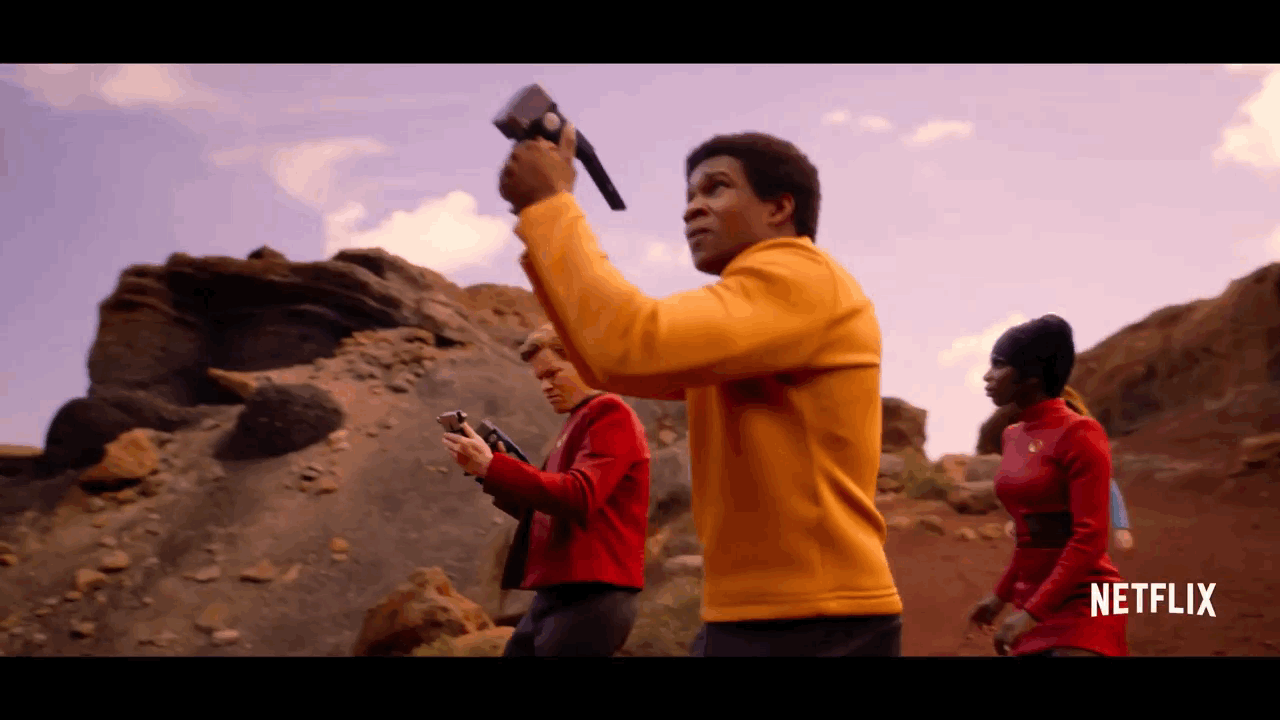The topic for this season of Black Mirror seems to be White Supremacy, and I guess somebody, (I won’t name names, but I will point in the general direction of my co-worker, Chad) feels some type of way about that.
“Racial issues” was the general theme of three key episodes of this season. The plot usually involved some form of technology that had gone horribly wrong, or gets badly misused because of the philosophy of a Toxic White person, and then some marginalized person catches some shit for it.
Yeah, I can see people feeling salty enough to give bad reviews, especially if the theme for this season seems to be “White people fucking up, y’all!” If things were reversed, and the theme was “Them Colored folk is fucking up the future!”, I’d be inclined to dislike it, too.
I watched all of the episodes, except Hang the DJ, because I’m not particularly interested in shows about young people falling in love.
USS Callister

My favorite episode was USS Callister. The story is blatantly feminist but that’s okay, because it was very entertaining, as a Star Trek parody that takes place entirely in one man’s head. At first I thought this was a straight up parody about the original Star Trek, and a critique of how the original got feminism wrong, but it turned out to be something very different.
An entitled and awkward game maker, who doesn’t feel appreciated enough in the real world, creates simulated versions of his co-workers in a virtual game, and I just thought it would be a comedy, but what elevates this above a parody is that he is White, he treats the other characters appallingly, and most of his simulated co-workers are women, and people of color, whose job it is to worship and praise him as the Captain of the USS Callister. Those who are not sufficiently worshipful are punished.
One of the few White male characters (his company partner in the real world) is punished, over and over again, by having a simulation of his son murdered in front of him, and the lone Black woman gets transformed into an alien monster, as punishment for the rebellious activities of the white female lead, trying to free them. The lone black male character is forced to speak in Af-Am vernacular and wear an Afro. The point of all of this is that all of these characters must live in stereotyped versions of themselves, and kowtow to the captain, while he uses the game to take out his real life racial and sexual resentments on these self aware, virtual, clones, who are powerless. When you couple all that with the sexlessness of the clones (none of them possess genitalia), it all adds up to some very deeply unhealthy ideas about sex, as well.

The simulations are not real people, but they are aware that they are trapped in a game called Infinity. They spend most of the episode trying to escape the simulation. The Captain also has access to their real world DNA, so they can never really die, as he can resurrect them anytime.
This particular episode is an indictment of toxic White masculinity in the gaming industry. Its also a commentary on Incels, the Alt-right, and gamergate.
http://collider.com/black-mirror-uss-callister-explained/
What’s brilliant about “USS Callister” is how it serves up its headfake in the first act. We think we’re about to see a story of a mild mannered genius who gets no respect, and the episode uses our assumptions against us. We’ve seen that story time and again, where the quiet nice guy is the hero, but the story this episode tells is one that rings true to the world we live in today.
Crocodile
Of all the episodes of Black Mirror, I think this one was the most hated, and I think it’s because a lot of critics didn’t understand what it was actually about. (Or maybe they did understand and it offended them.) There was also a certain contingent of people who simply couldn’t get past the deaths of the Muslim family in the episode, not quite understanding, that was the point, and could not have been made otherwise.
/cdn.vox-cdn.com/uploads/chorus_image/image/58268459/Black_Mirror_Season_4_Andrea_Riseborough_in_Crocodile.0.jpg)
I’ve read several reviews of this episode, and when I speak on ‘critical diversity’ issues, the fact that none of the reviews I’ve read mention race as a factor to this narrative, is exactly the sort of thing I’m talking about.
Most of the episode takes place in an Icelandic landscape, and is about a White woman, who goes on a killing spree, based on a killing she committed many years ago. Now she does kill another person in the narrative, but what many reviewers refuse to mention is that she also, coldbloodedly, murders a Muslim couple, and their baby.
Several years ago, Mia was present at the killing of a homeless man, via hit and run. Her boyfriend was the one who committed the deed, and years later, wracked with guilt, he comes back to tell her he’s going to confess. She kills him. During this meeting another man is hit by a car outside the hotel where Mia and her old boyfriend have met, and Mia is called in as witness by a young Muslim woman named Shazia. Shazia has a device that can probe a person’s recent memories ,and uses it on Mia, who cannot disguise the reason she was at the hotel, and that she killed her old boyfriend, at that time.

Mia ties Shazia up, and using the memory device on Shazia, finds out that Shazia’s husband knew where she was going. She kills Shazia, and then goes to her home, and kills her husband, and their baby, just in case the device can be used on him. There is a guinea pig in the room, but Mia doesn’t kill it, and the device apparently works on animals, because Mia gets arrested while at her son’s recital that evening.
The title is a reference to the Crocodile Tears that Mia cries throughout the entire episode. Mia is always crying. She cries after she kills the homeless man. She cries after she kills her old boyfriend. She cries after killing Shazia, and her family. But all these tears do not stop her from being cold-bloooded (ie. reptilian) enough to kill a mother, her husband, and her baby to serve her own needs. Mia’s tears are meaningless, and are ultimately only about her own discomfort, and the possible loss of her lifestyle, with a new husband and career, and have nothing to do with the horrors she’s enacting. It is telling that Mia is cold enough to kill a baby, but cares enough not to kill the guinea pigs sitting on the table in the baby’s room.

To me, a lot of these episodes are an indictment of White women who devalue the lives of women of color, and prioritize Whiteness. What Mia is doing, willingly taking the lives of marginalized others to save her own, while supposedly feeling sorry about it, is a definite reference to White feminism, the kind of feminism that is willing to throw other women (and even their children) under the bus to preserve itself, and can be directly attributed to the 53% of White female voters who put Donald Trump in the White House. I think this episode speaks directly to the hypocrisy of such women, as Mia considered the life of the family of guinea pigs to be worth more than the life of the human baby she murders, and next to The Black Museum, this is the second most powerful episode in the season.
Throughout the entire episode, Mia keeps telling herself she has no choice but to do these things, and what’s worst , she tries to convince Shazia of this as well. Of all the choices she doesn’t consider, giving up her privileged, upper class lifestyle by confessing to the police, is never one of them. At every step along the way, Mia could have stopped, but she is too cowardly, and self involved, and cries because SHE is the one in pain, while she causes pain to others. Mia is a monster in every sense of the term.
Its interesting to me that reviewers can easily see that the USS Callister episode was about male entitlement, and sexism, but when it comes to the events of Crocodile, reviewers conveniently fail to “get it”, never mentioning that three of the people Mia kills are a dark skinned Muslim family. In some cases, the critics walk right up to the issue, and then neatly sidestep as if the subject of White racism is the least important (or most banal) part of the episode ,and they simply cannot be bothered with such a topic.
Crocodile Tears: The Violence of White Womanhood in Netflix’s ‘Black Mirror’ Episode “Crocodile”
by Talynn Kel (On Medium. Com/ for Members Only)
Black Museum

I spoke about this particular episode in an earlier post on why we need more Black critics. of the three episodes I talk about here, this one was the stand out.
https://tvgeekingout.wordpress.com/2018/01/10/black-mirror-and-critical-diversity/
*On the subject of the critical reception of this season, I want to list The Verge, for getting every single one of its hot takes of this season wrong. In every episode that approaches race, the critics of The Verge manage to totally not “get it”. (In one case, a critic ignores the message of Black Museum entirely, to focus their attention on the White male villain of the episode.) Now there isn’t anything wrong, in particular, with the individual critiques but when coupled with the all the others that never mention any of the blatantly racial aspects of these episodes, I’m inclined to give the critics of The Verge (and The Vulture) a confirmed side eye.
That said:
http://feministing.com/2016/09/21/film-critics-talk-racism-in-the-movie-industry/
Crocodile Tears: The Violence of White Womanhood in Netflix’s ‘Black Mirror’ Episode “Crocodile” — Part One (SPOILERS AHEAD FOLKS SO STRAP IN)
—– Medium.com

I did wonder about the white landscape of Iceland and the character Mia is a very pale blonde white woman. I wondered if this was some type of metaphor or symbolism? She was the quintessential privileged white woman going about her life while being a murderess. And then she cried her “white woman tears.”
LikeLiked by 1 person
I did have an uneasy feeling about the Muslim family that she murdered at the end, that bothered me as well.
LikeLiked by 1 person
Black Mirror is one of my favorite Netflix shows. Black Museum and Crocodile were my favorite episodes from the new season. When I watched the Black Museum episode i had a feeling that Letitia Wright had star quality, didn’t know she would be in Black Panther and be among one of my favorite characters in the film, hope to see more of her in the future.
LikeLiked by 1 person